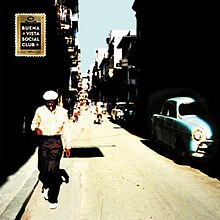Buena Vista Social Club (album)
| Buena Vista Social Club | ||||
|---|---|---|---|---|
 |
||||
| Studio album by Buena Vista Social Club | ||||
| Released | September 16, 1997 | |||
| Recorded | March 1996 (over seven days) at Egrem studio, Havana,Cuba | |||
| Genre | Son cubano, bolero, descarga, danzón, guajira, criolla | |||
| Length | 60:00 | |||
| Label | World Circuit, Nonesuch | |||
| Producer | Ry Cooder | |||
| Buena Vista Social Club chronology | ||||
|
||||
| Professional ratings | |
|---|---|
| Review scores | |
| Source | Rating |
| Allmusic | |
| Entertainment Weekly | B+ |
| Rolling Stone | |
| Vibe | (favorable) |
Buena Vista Social Club is a studio album by Cuban bandleader and musician Juan de Marcos González and American guitarist Ry Cooder with traditional Cuban musicians, released on September 16, 1997 on World Circuit Records.
The album was produced by Cooder who travelled to Cuba to record sessions with the local musicians, many of whom were previously largely unknown outside Cuba. The musicians and the songs would later appear in the documentary of the same name Buena Vista Social Club by director Wim Wenders.
The music featured on the album was inspired by the Buena Vista Social Club, a membership club that was at its height during the 1940s and 1950s. Many of the musicians performing on the record were either former performers at the club or were prominent Cuban musicians during the era of the club's existence. Other younger musicians on the record trace their musical roots back to pre-revolutionary Cuban music, mainly the famous Havana musical scene of the 1950s.
Buena Vista Social Club earned considerable critical praise and has received numerous accolades from music writers and publications. In 2003, the album was ranked number 260 on Rolling Stone magazine's list of the 500 greatest albums of all time, one of only two albums on the list to be produced in a non-English speaking country. The album was also included in the book 1001 Albums You Must Hear Before You Die. As of 2015, the album has sold over 12 million copies.
In 1996, American guitarist Ry Cooder had been invited to Havana by British world music producer Nick Gold of World Circuit Records to record a session where two African High-life musicians from Mali were to collaborate with Cuban musicians. On Cooder's arrival (via Mexico to avoid the ongoing U.S. trade and travel embargo against Cuba), it transpired that the musicians from Africa had not received their visas and were unable to travel to Havana. Cooder and Gold changed their plans and decided to record an album of Cuban son music with local musicians. Already on board the African collaboration project were Cuban musicians including bassist Orlando "Cachaito" López, guitarist Eliades Ochoa and musical director Juan de Marcos González, who had himself been organizing a similar project for the Afro-Cuban All Stars. A search for additional musicians led the team to singer Manuel "Puntillita" Licea, pianist Rubén González and octogenarian singer Compay Segundo, who all agreed to record for the project.
...
Wikipedia
